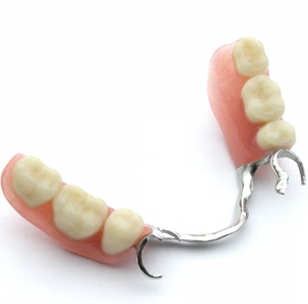 What is a removable prosthetic?
What is a removable prosthetic?
A removable prosthetic (denture) is designed to replace missing teeth, and is made mostly of plastic. Saving a few natural teeth is often better than losing them all. Some people may assume that they will need dentures as they age, however losing teeth is not a part of the natural aging process.
If you care for your teeth well and guard against gum disease, you should be able to keep your teeth for a lifetime. Natural teeth, and parts of your natural teeth can help you retain bone in your jaw, and act as stable supports for bridges, overdentures , or removable partial dentures. Our philosophy is to try and keep and maintain as many of your natural teeth as possible.
Dentures can either be complete or partial. Complete dentures are made for patients who have lost all of their teeth. They can be given more support by placement of implants in the bone under the denture, however not every patient may be suitable for this type of procedure.
Complete dentures are custom made for you. This process takes several appointments to complete including an impression, try in, and choosing the size, shape and colour of your artificial teeth. Learning how to chew food and speak take patience and practice with your new prosthetic.
On occasion if one or more natural teeth can be kept, these teeth can be root canal treated and shortened to fit under the denture. This type of denture is called an overdenture. Maintaining a few natural teeth help to:
preserve bone
reduce pressure on other areas of your jaw
make the denture more stable, less likely to shift
Teeth that will be preserved in an overdenture must meet certain standards of health, Typically canines and premolars are chosen because of their position and root length. The teeth that remain are fitted with a thin metal castings called copings. They fit into the openings in the denture. Attachments can also be placed on the copings to help retain the denture.
Partial dentures consist of a metal framework with plastic teeth and gum areas. Metal clasps and other attachments hold the denture in place. Partial dentures can easily be removed for cleaning. Teeth around the clasps, require shaping to hold the clasps and keep the denture in place. A precision attachment is a special attachment that can be made by placing crown over your tooth these are made to fit together.This type of denture looks better as there are no visible clasps, however it takes more skill to fit it properly in place.
Other types of dentures include conventional dentures, that are custom made and inserted after your teeth have been taken out and the gums have healed. You may require an immediate denture to use in the interim while your custom ones are being made, and your gums are healing. You will learn how to take care of your dentures, and may need a few follow up visits to check for fit and comfort. In time dentures made need to be adjusted, relined and remade. Due to the harsh oral environment, it is recommended that you replace dentures every 5 years as the plastics absorb oral microflora and start to deteriorate.